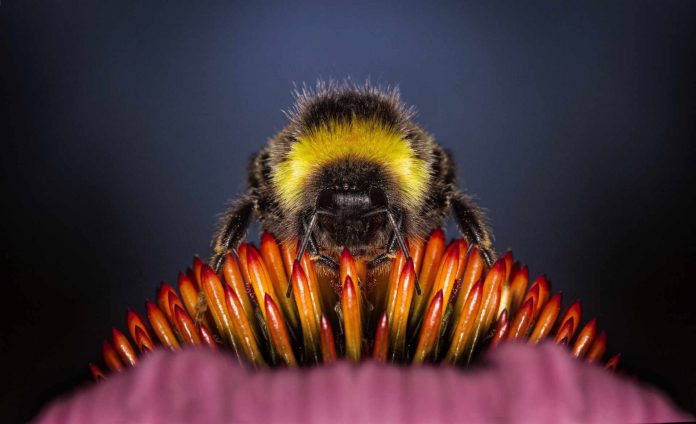Will there be robot-bees in the future? It has been discovered that Walmart filed for a patent for robotic bees that would be autonomous pollination drones for crops. The Robo-bee patent marks only one of six patents Walmart filed for drone farming tech.
How does it work? The robotic bees would include at least one pollen applicator and one sensor to detect the pollen per device. The patent notes that there has been a steady decline of pollinators in recent years. Concerned, scientists have held discussion surrounding crop dusting the pollen onto the plants, but they think that technique would lack the targeted nature needed for the plants to thrive, which brought them to the solution of robo-bees.
This isn’t the first time we have heard of this end of days technology. Harvard University researchers brought their bees to the scene in 2013. Originally, the bee-bots had to be tied to a power source to fly or hover in the air. Scientists have expanded the bees abilities, now incredibly they can dive in and out of water, swim underwater, and stick to surfaces.
It’s unreported as to exactly how these robotic bees will be implemented in Walmart, but it seems that the big box store might be planning a business in agriculture by farming its own crops.
Subscribe to the Christian Journal Daily to stay updated about the latest Christian World News
The bee drone technology, which was explored in season 3 of Black Mirror, could theoretically give Walmart an edge in food production over the long term.
[fvplayer src=”https://player.vimeo.com/external/260414390.sd.mp4?s=2c605e29c1b284dfcd4d2cb1d822235613dbc073&profile_id=164″ splash=”https://christianjournal.net/wp-content/uploads/2018/03/bee-3216973_640.jpg”]
Honey bees are vital for life on earth to continue as normal.
Science ABC explains the effects bee extinction would have on human life:
“Less production of food crops will ultimately lead to worldwide famine. Hunger and poverty will be very common. Freshwater will start drying up as well as, as there will be less trees for water retention to occur. With less water and diminishing food, humans will die of thirst and starvation. Fertility would also suffer a setback, followed by a drop in the rate of reproduction. Ultimately, we wouldn’t be able to sustain and would be forced into extinction within a few hundred years.
Unless scientists build robotic bees to do the jobs that honeybees once did, we’re ultimately doomed. And although this isn’t the most serious repercussion, we would never again taste that sweet, savory honey that we forcibly steal from honeybees every day.
The tragic irony of this is that by killing bees, we’re only hurting ourselves. Our survival depends on the health of the planet and its species, and unless we begin to face this fact, we will continue to contribute to our own demise. Unless we take drastic measures to save the bees, the planet’s survival is in doubt.”
Thirst, starvation, poverty, and problems with fertility are only some of the issues that would catapult our society into collapse, and ultimately human extinction due to the loss of bees. A species so small matters so much that if it went extinct, so would everything else. Scientists know this which is why they are patenting robotic insects that could save humanity in the face of such a loss of biodiversity.
Some experts, like Quinn McFrederick, an entomologist at the University of California, think it’s far smarter to spend resources protecting the real bees we have today.
“On top of more practical arguments, such as costs to smaller farms,” he told NPR, “I would not like to live in a world where bees are replaced by plastic machines. Let’s focus on protecting the biodiversity we still have left.”


![[VIDEO] Drag Queen Drag Shows Are Now Infesting Churches](https://christianjournal.net/wp-content/uploads/2019/11/Screenshot-2019-11-22-at-9.02.01-PM-218x150.png)
![[VIDEO] Starbucks Worker Dumps Milkshake On Open Air Preachers Head](https://christianjournal.net/wp-content/uploads/2019/11/Screenshot-2019-11-22-at-7.23.43-PM-218x150.png)
![[VIDEO] Man Arrested For Threatening To Kill Female Abolitionist With Crowbar](https://christianjournal.net/wp-content/uploads/2019/11/MLock-1-218x150.jpg)
![[VIDEO] Drag Queen Drag Shows Are Now Infesting Churches](https://christianjournal.net/wp-content/uploads/2019/11/Screenshot-2019-11-22-at-9.02.01-PM-100x70.png)
![[VIDEO] Starbucks Worker Dumps Milkshake On Open Air Preachers Head](https://christianjournal.net/wp-content/uploads/2019/11/Screenshot-2019-11-22-at-7.23.43-PM-100x70.png)
![[VIDEO] Man Arrested For Threatening To Kill Female Abolitionist With Crowbar](https://christianjournal.net/wp-content/uploads/2019/11/MLock-1-100x70.jpg)


